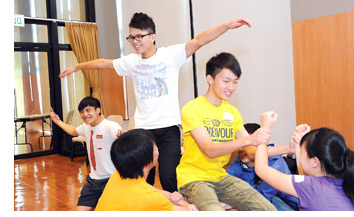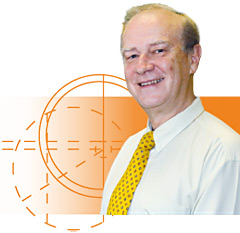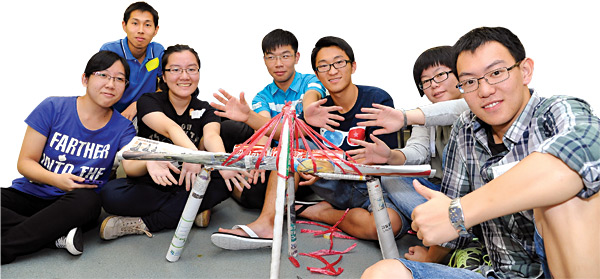|
A remarkable welcome to life at the School of Engineering awaited the first batch of Year 1 four-year undergraduates
 The city-wide 334 reform, which has seen Hong Kong move to a six-year secondary school, four-year university degree education system, brought the first intake of four-year undergraduates to the School of Engineering in September 2012. The city-wide 334 reform, which has seen Hong Kong move to a six-year secondary school, four-year university degree education system, brought the first intake of four-year undergraduates to the School of Engineering in September 2012.
These 750 young engineers are younger than their three-year counterparts, with a broader secondary school diploma experience and more varied academic backgrounds than the focused approach of Hong Kong A-level graduates. At the same time, the four-year degree system they have entered is more open and flexible than the three-year system, giving them a year to explore their interests before choosing a major, and a wider range of courses to select throughout their time at the School.
To assist the Year 1s in their academic choices, transition from school to university, and to foster a sense of belonging and identity, the School implemented a fresh introduction to the university experience, tailored to these students' needs and groundbreaking in its approach to engineering education support.
 Clan-tastic Clan-tastic
On arrival at HKUST, four-year entrants were placed into one of nine "clans", which immediately enfolded them within a group environment. Members include a mix of local, mainland and international Year 1s, student mentors from other years, faculty members, and a "clan fellow", often a Head of Department. Even the Dean participates.
"The clan concept covers four main areas, academic, social, emotional and institutional attachment, to help Year 1s over the transition from school to university and to expand their university experience," said Prof Roger Cheng, Associate Dean (Undergraduate Studies). "For example, in their first year in the clan, they will also get to know people who may eventually choose different majors from themselves. This can help interdisciplinary communication."
One activity to help clan members get to know each other saw professional trainers with experience of working with major corporations and engineers hired for a one-day team-building camp. Each clan offered its own camp, securing 60% to 70% total participation – a major success for a non-compulsory activity held at a weekend.
"After the camp, we had lots of positive feedback," Prof Cheng said. "The young engineers were surprised and pleased that we would organize something like this for them."
Engineering ID
Building awareness of what engineering is all about is another crucial aspect of the Year 1 experience at the School. One way in which this is realized is through addressing new entrants as "young engineers" rather than students to emphasize the School's professional aspect. The ENGG1010 Academic Orientation, which has been made a required course for graduation, is another essential element.
"This is part of students' education as engineers," said Prof Neil Mickleborough, Director of the School"s Center for Engineering Education Innovation.
 "So we have workshops covering topics such as engineering identity, the purposes of university education, and key attributes of engineers. Through these workshops, individual advising sessions, and other clan-based social activities, such as barbeques, our school-level faculty advisors, peer mentors and colleagues can proactively keep in touch with Year 1s and support them when necessary," he said. "So we have workshops covering topics such as engineering identity, the purposes of university education, and key attributes of engineers. Through these workshops, individual advising sessions, and other clan-based social activities, such as barbeques, our school-level faculty advisors, peer mentors and colleagues can proactively keep in touch with Year 1s and support them when necessary," he said.
The close contact has already proved useful. For example, some young engineers revealed that they had difficulty in studying a particular course. Those who had done well in their mid-term examination in this area were then asked to form study groups with their peers who were finding the work challenging. "Both parties found this helpful, "Prof Mickleborough said. School faculty advisors also provided assistance.
Another novel aspect of the Academic Orientation course is its incorporation of student advising. "We approach academic advising as a learning experience for our young engineers instead of developmental or administrative exercise," Prof Mickleborough said. "It should be something inside the curriculum. Therefore, we have integrated academic advising into a graduation requirement course. This form of advising appears unique in Hong Kong."
Selecting a pathway
One of the major differences for the young engineers is the amount of choice they have in selecting the courses they will study. "The approach is very different from the three-year program," said Prof Cheng. "We have moved from basically one size fits all to an individual preferences-based model. I think this has been welcomed by the young engineers. It also fits our educational goals, which are to recognize that different students have different aspirations and to give them the freedom to choose and move at their own pace."
Hands-on training for Fall registration
To assist young engineers with the online course registration process to select courses at the beginning of Fall Semester, the School organized hands-on group sessions and briefings in the summer. These included short introductions to the courses available and a chance to try out making a selection on the system (a final decision could be made later). Trained peer mentors were also available to discuss selections.
 Individual advice for Spring Semester Individual advice for Spring Semester
In October 2012, the young engineers received one-on-one advising sessions with a School of Engineering professor to help in their selection of courses for the Spring Semester. In these sessions, they were encouraged to talk about what they would like to do, their interests and how these may link up with a major, and any issues. These sessions were highly valued by the young engineers, according to Prof Cheng.
Choosing a major
At the end of Spring Semester 2013, the young engineers will need to decide on their major. Information sessions were organized in November and December 2012 by Departments and more are being arranged. Further advising sessions are also envisaged to help the young engineers decide what they would like to do.
Year 2
As the young engineers enter a particular major, activities will move to the department rather than school level. However, the first year will act as a model, with the Center for Engineering Education Innovation continuing to offer assistance to the young engineers and assisting faculty on how to provide support.
Foundation for the future
While an evolving learning process for faculty, staff and young engineers, the first semester and feedback on the various activities have provided a valuable foundation on which to build.
One significant outcome already noticed is a stronger link between faculty and the young engineers. "For instance, it seems with the one-on-one session in the Fall, the young engineers felt faculty became more approachable," Prof Cheng said. "This is important. People influence people. If you go to class or lab and never talk to the faculty member, then the learning experience is quite different from if you feel able to approach an academic. This will have a long-lasting impact on their four years at HKUST."
"From the faculty perspective, we feel that more of them see the importance of providing advice to students and more are participating," he said.
Working together with the young engineers have also provided the best moments of the semester for Prof Mickleborough. "You can see the maturing and the building of confidence in the Year 1s as they adjust to the environment and adopt the School of Engineering as their home."

|